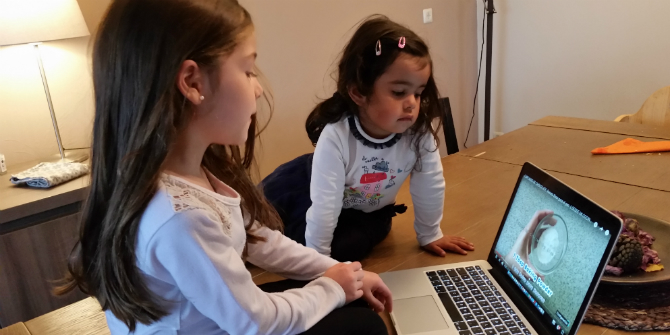 Lelia Green takes a closer look at how parents’ attitudes to children’s digital media use change as they move towards adulthood. Lelia is Professor of Communications in the School of Arts and Humanities, Edith Cowan University, Perth, Australia. Her current research investigates the different influences of parents and peers on young people’s internet use. [Header image credit: R. Pollard, CC BY 2.0]
Lelia Green takes a closer look at how parents’ attitudes to children’s digital media use change as they move towards adulthood. Lelia is Professor of Communications in the School of Arts and Humanities, Edith Cowan University, Perth, Australia. Her current research investigates the different influences of parents and peers on young people’s internet use. [Header image credit: R. Pollard, CC BY 2.0]
Leslie Haddon’s and my recent research with parents of four 17-year-old male online gamers indicates that the high level of skills and competencies required by young people who are members of an online gaming team may become appreciated over time. As well as expressing a grudging respect for what their sons could achieve online, these parents talked about the risks of being addicted to games compared with other risks sometimes evident in this age group, including alcohol, sex, drugs, fast cars and violence. Although they still wanted their sons to have a better balance in their lives, they were pleased with the strong social connections that their sons had formed across several years of membership in an online gaming team. The parents had started off intending to restrict access to game playing, and in some cases still imposed a curfew on weekday nights, but they said that, as time progressed, they had learned to respect the fact that their sons had obligations to their gaming team, as well as to their family, and both parties had put processes in place to help acknowledge and negotiate these dual commitments.
New rules in becoming peri-adults
As older teens grow closer to adulthood, parents cope with an evolving range of challenges to their authority as well as a slew of new behaviours. The argument about why it is necessary to use a parent’s credit card to subscribe to an online game support service, for example, becomes one reason why the young gamer wants to apply for a debit card of his own. Mum Cath says about her son:
[Mike] wanted his own debit card [so] he could do it himself…. He does seem to know exactly what he’s doing … because before that it was our credit card on there. I wasn’t really comfortable with that.
Similarly, discussions about whether it’s really a priority to buy a new graphics card for a better gaming experience lose their bite when the teen in question has their own savings account and has been encouraged to budget for themselves.
In-depth research rarely captures the final stages of the digital parenting experience because big projects, such as EU Kids Online, tend to focus on the child and adolescent, rather than the peri-adult. Yet at some point, parents have to accept that their role as a digital mediator is drawing to a close, and the child they still worry about will nevertheless soon be considered by wider society to be an autonomous agent and beyond parental control. This perspective of letting go the need to police and control actions, and appreciating the fledgling adult that their child has become, permits a different focus on the process of digital parenting. The research reported here indicates that parents may reach a point of acceptance, where they acknowledge that they have done their best, and that it is now up to the child to set their own rules going into the future. One parent explained:
I’m just going [speaking to myself]: ‘Actually, you know, he’s a lovely boy. Do we want to spend our lives in complete conflict? He’s not going to change. He’s not voluntarily going to give this up. It’s not affecting his schoolwork.’ Well, maybe it has, maybe he could get better marks but, you know, who knows?… Maybe not. Maybe he’d just be depressed or something.
Building relationships and responsive digital parenting
Research participants talk about this stage of parenting as being one of building a relationship with their child as an emerging adult. The value of that relationship is seen as being of far greater importance than imposing and policing rules around online gaming practices. The awareness that their child may soon be leaving home – as was the case with the teens in this study – heightens the perception that relationship building is now the parents’ top priority.
Whether or not parents agree with its appropriateness, the Western world usually constructs either the 18th or 21st birthday as the watershed between being a child and being an adult. The person who was previously a vulnerable minor protected by a range of policies and practices becomes, overnight, a notionally competent, confident adult, and often a member of a particularly attractive consumer cohort. Young people who may still be living in their parents’ homes without dependents or long-term financial commitments are likely to have above-average disposable incomes. Many organisations, enterprises and services seek to recruit these new adults to their consumer base. At the same time, these recent adults are autonomous in ways that 16- and 17-year-olds are not. Responsive digital parenting on the brink of this metamorphosis takes these factors into account, valuing the different priorities that necessarily mark the different generations, and seeking to strengthen the shared relationship that bridges the divide.
Parents in this research suggest they have developed new understandings of the contribution that online game playing makes to their sons’ lives. For example, Gill commented:
… all the psychologists have gone on about boys not communicating and not talking to each other. And I said, ‘When they have their friends round [gaming] … they never stop talking!’
Cath’s view of her son Mike is that
He’s very fast on his computer, very fast. His reactions, sometimes [pauses] I stand and watch him and I can’t believe he’s almost doing three or four things at the same time. Amazing.
In this case, the parents interviewed had made a transition from comparative regulation of their sons’ gaming habits to negotiated acceptance, and were happy with the outcome. It may be the case that the strength of these parents’ commitments to active digital parenting in their child’s early teen years provided the bedrock on which a mutual appreciation of each others’ perspectives could be built.
Changing views
Although the research, reported on in LSE’s Parents’ reflections upon mediating older teens online gaming practices, involves a small cohort of five parents from three families, it could form the basis of a nuanced appreciation of how parents’ views change and mature over time in line with their understanding of the benefits, as well as risks, encountered by their children during their online activities. Certainly, it indicates that parents of older teens may be less concerned about restriction and regulation of their time online, and more concerned about finding positive ways to understand and validate the passionate commitment that their peri-adults feel for their digital lives. These parents indicate that respecting a child’s online skills is a helpful starting point to resolving some of the challenges that parents experience when mediating children’s digital activities.






